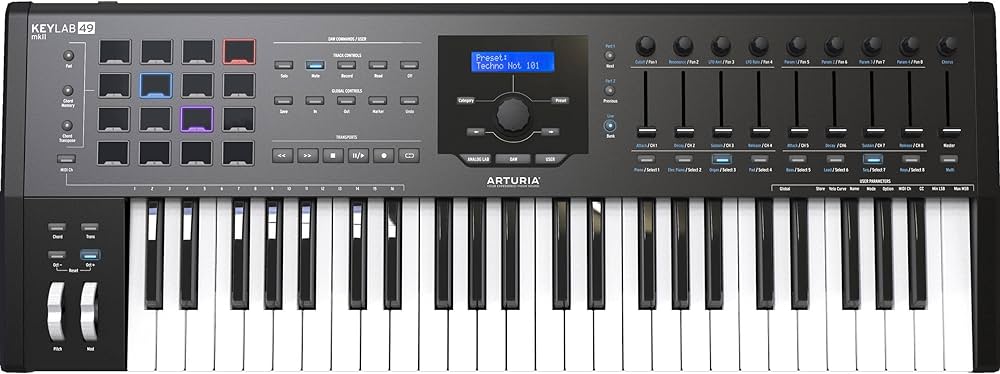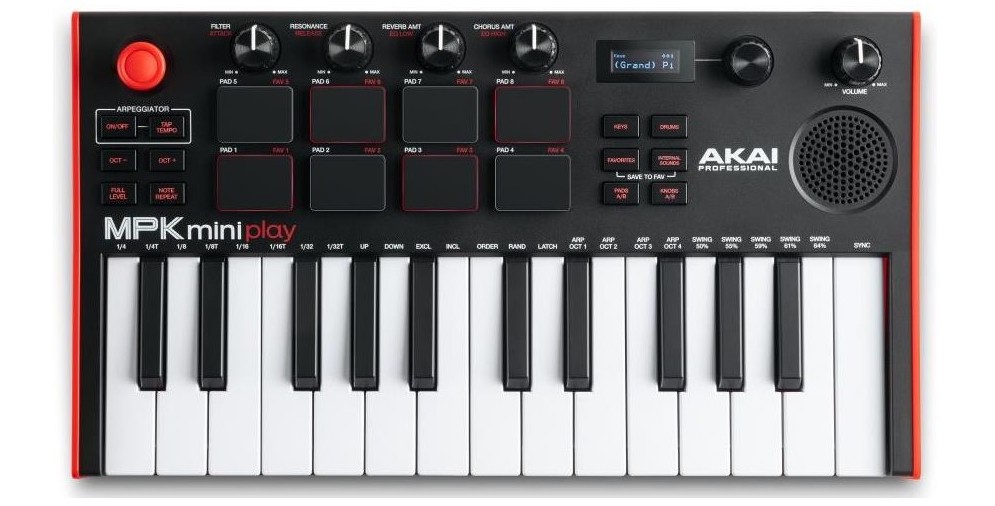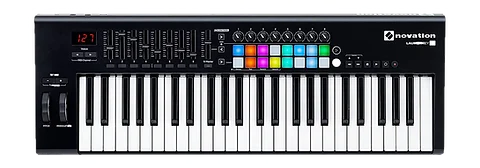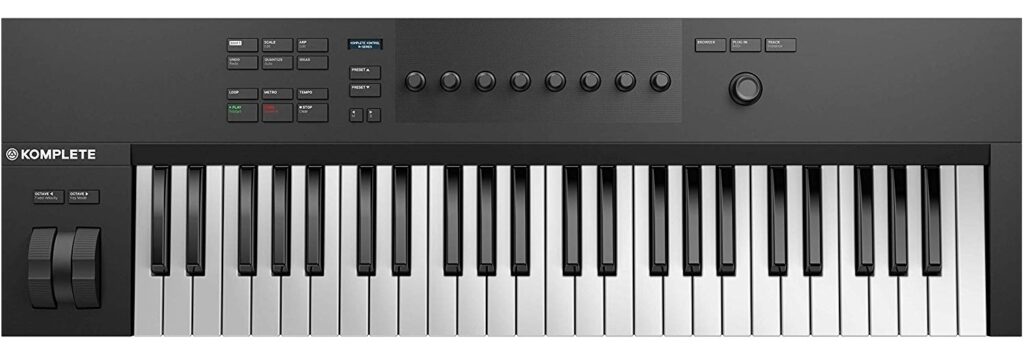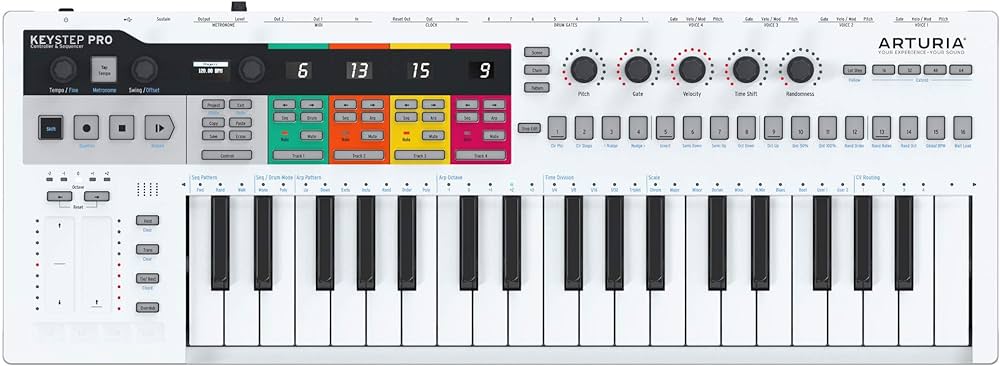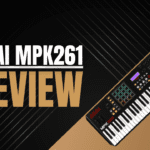Investing in a MIDI keyboard can take your music production to the next level. This comprehensive guide reviews the 9 best MIDI keyboards (also called MIDI controllers) on the market in 2023 based on key factors like playability, controls, connectivity, portability, and value.
Choosing the right MIDI controller can take your music production to the next level. But with so many options, it can be tricky to pick the perfect one.
This article will help you find the 9 best MIDI keyboards on the market in 2023.
Why Read This Buying Guide
- Get advice from an expert on how to choose the right MIDI keyboard for your needs
- Discover the key features to look for when shopping for a MIDI controller
- Learn about the top 9 highest-rated MIDI keyboard options across all budgets
- Find the best MIDI keyboard for your music production setup, whether you’re a beginner or pro
How to Choose the Best MIDI Keyboard for Yourself
When selecting a MIDI controller, consider these important criteria:
- Number of keys – 25, 49, 61, 76, or 88 keys. More keys allow playing wider ranges.
- Key feel – Non-weighted synth action, semi-weighted, or weighted hammer action. Weighted keys feel more realistic.
- Extra controls – Knobs, faders, pads, buttons for controlling software parameters. More controls provide greater flexibility.
- Connectivity – Standard connections like USB, MIDI, CV/Gate. Wireless offers more freedom.
- DAW Integration – Pre-mapped controls for DAWs like Ableton Live, Logic Pro, FL Studio. Allows tighter software control.
- Portability – Smaller 25-49 keyboards are better for travel. Larger ones offer more playability.
- Budget – Prices range from $100 to $1000+. Consider how much you want to spend.
With these factors in mind, let’s review the top 9 MIDI keyboard options for 2023.
1. Arturia KeyLab MKII 49 – My Top Pick
The Arturia KeyLab MKII 49 combines premium quality with an affordable price. It has 49 velocity and pressure-sensitive keys with a great synth-action feel. The sturdy metal construction gives it a solid weight.
The MKII 49 offers deep DAW control with transport buttons, 16 RGB pads, 9 faders, and 9 rotary encoders. It comes bundled with Arturia’s Analog Lab software full of classic keyboard sounds.
For playability, versatility, and value, the KeyLab MKII 49 is hard to beat as the best overall MIDI keyboard.
Key Features:
- 49 premium synth-action keys with velocity and aftertouch
- Solid aluminum and metal construction
- Integrated transport and DAW controls
- 16 velocity-sensitive RGB pads
- Bundled with Analog Lab V software
Pros:
- 49 premium synth-action keys with velocity/aftertouch
- Solid aluminum/metal construction
- Integrated transport and DAW controls
- 16 velocity-sensitive RGB pads
Cons:
- More expensive than other 49-key options
- Some controls feel a bit dated
I’ve used the Arturia KeyLab MKII 49 extensively in my home studio for the past year. The keys feel fantastic to play – very responsive and expressive. The RGB pads also make it easy to trigger clips and samples. The build quality is solid and it integrates nicely with my DAW. One downside is the faders and knobs feel a bit plasticky and cheap. But overall an amazing MIDI controller for the price.
2. Native Instruments Komplete Kontrol S88 MK2 – Best Weighted Keys
The Native Instruments Komplete Kontrol S88 MK2 is the ultimate MIDI keyboard for pianists seeking weighted hammer-action keys.
The S88 MK2 has 88 fully-weighted keys with aftertouch modeled precisely after grand piano keybeds for unrivaled response. The Smart Play features help with voicings and wrong notes.
It provides seamless integration with NI’s Komplete instruments and effects suite. The brilliant OLED display gives instant visual feedback.
For realistic weighted key action and intuitive software control, the S88 MK2 is hard to beat.
Key Features:
- 88 weighted hammer-action keys with aftertouch
- Smart Play assists with voicings and wrong notes
- OLED display provides visual feedback
- Fully integrated with Komplete instruments and effects
- Premium Fatar keybed modeled after grand pianos
Pros:
- 88 weighted hammer-action keys
- Smart Play features for voicings/wrong notes
- Brilliant OLED display provides feedback
- Fully integrated with Komplete instruments
Cons:
- Very heavy and bulky
- Expensive price point
I love the fully weighted hammer-action keybed on the S88 MK2. It really mimics the nuanced feel of playing on an acoustic grand. The Smart Play features also help me sound more musical when improvising. My only gripe is that it’s incredibly heavy – nearly 50 lbs! Not very fun to move around. But if you want weighted keys, the S88 is unbeatable.
3. Akai MPK Mini MK3 – Most Portable
The Akai MPK Mini MK3 is an ultra-compact MIDI keyboard perfect for travel and tight spaces.
It packs 25 velocity-sensitive synth-action keys and 8 backlit MPC-style pads into a portable controller that runs on USB power. The 8 assignable Q-Link knobs are great for tweaking software parameters.
This mighty mini keyboard maps easily to all major DAWs. The MK3 adds handy arpeggiator and sustain features.
For music production on the go, the MPK Mini MK3 delivers surprising functionality in a portable package.
Key Features:
- 25 velocity-sensitive mini keys
- 8 backlit MPC-style pads
- 8 assignable Q-Link control knobs
- USB bus powered – no power supply required
- Deep integration with all major DAWs
- Arpeggiator and sustain features
Pros:
- Ultra-compact and portable
- 25 velocity-sensitive mini keys
- 8 MPC-style backlit pads
- USB bus powered
Cons:
- Keys are tiny and cramped
- Limited to 25 keys
- No 5-pin MIDI connectivity
I travel frequently for shows, so the portability of the MPK Mini MK3 is perfect. It’s amazing that Akai packs so much control into such a tiny footprint. I do wish the mini keys were slightly bigger, but it’s a fair trade-off for mobility. The pads are great for finger drumming. At around $100, it’s my go-to recommendation for beginner producers on the go.
4. Novation Launchkey MK3 49 – Best for Ableton Live
Designed for tight integration with Ableton Live, the Novation Launchkey MK3 49 is the best MIDI keyboard for controlling the DAW.
It has 49 semi-weighted velocity-sensitive keys with an aftertouch for great playability. The 16 RGB pads trigger clips and play drums with sensitivity.
Eight knobs and nine faders provide extensive mixer control over tracks, volumes, sends, and more. The intuitive interface speeds up workflow.
For hands-on control of Ableton Live’s instruments and tools, the Launchkey MK3 49 is unmatched.
Key Features:
- 49 semi-weighted velocity-sensitive keys
- 16 RGB velocity and pressure-sensitive pads
- Eight knobs and nine faders for mixer control
- Deep integration with Ableton Live
- Keyboard modes enhance creativity
Pros:
- 49 semi-weighted velocity-sensitive keys
- 16 RGB velocity/pressure-sensitive pads
- Deep integration with Ableton Live
Cons:
- Keybed could feel more realistic
- No aftertouch on keys
I really appreciate the deep integration of the Launchkey MK3 49. The RGB pads speed up my workflow for launching clips and scenes. The keybed action could feel a bit more weighted and realistic – but overall it’s a great MIDI keyboard for controlling Live. Very intuitive even for beginner producers.
5. Nektar Impact LX61+ – Best MIDI Keyboard for Logic Pro

The Nektar Impact LX61+ is designed for seamless DAW control and integrates tightly with Logic Pro.
It has 61 full-size velocity-sensitive keys with aftertouch for expressive playing. The keyboard has nine faders, nine buttons, and eight knobs that provide hands-on control over Logic’s software instruments and mixing.
The comprehensive LCD screen shows track data, VST parameters, and more. It also comes bundled with Bitwig 8-Track DAW.
For deep Logic Pro integration at an affordable price, the Impact LX61+ is a top choice.
Key Features:
- 61 velocity-sensitive keys with aftertouch
- Extensive DAW controls – knobs, faders, buttons
- LCD screen displays track data and plugin parameters
- Bundled with Bitwig 8-Track DAW
- Deep integration with Logic Pro
Pros:
- 61 velocity-sensitive keys with aftertouch
- Extensive DAW controls like faders and knobs
- Deep integration with Logic Pro
- LCD screen shows track data
Cons:
- Keys don’t feel as realistic as other options
- Limited integration with non-Logic DAWs
I bought the Impact LX61+ specifically for controlling Logic Pro, which it does very well. The LCD screen clearly shows all the track data and plugin parameters, making workflow much faster. The keys feel a bit plastic-y compared to more expensive keyboards, but overall it’s great for the price. My only complaint is the pitch and mod wheels feel quite flimsy. But for Logic integration, it delivers.
6. Roland A-88MKII – Best MIDI Keyboard for Ableton Live
The Roland A-88MKII is an outstanding MIDI keyboard for controlling Ableton Live and VST instruments.
It has 88 weighted keys with Ivory Feel that provides a realistic piano touch. The dedicated Ableton Live controller buttons allow easy clip launching and track control.
The keyboard has eight faders, nine knobs, transport controls, and an onboard arpeggiator. The intuitive interface speeds up workflow in Ableton.
With its weighted keys and deep Ableton integration, the A-88MKII is a top pick.
Key Features:
- 88 weighted keys with Ivory Feel
- Dedicated Ableton Live controller buttons
- Eight faders and nine knobs
- Transport controls and arpeggiator
- Seamless integration with Ableton Live
Pros:
- 88 weighted keys with Ivory Feel
- Dedicated Ableton Live controller buttons
- Eight faders and nine knobs for mixing
- Onboard arpeggiator
Cons:
- No aftertouch on keys
- Expensive compared to other 88-key options
I really appreciate the high-quality weighted keys on the Roland A-88MKII. The Ivory Feel keybed is the closest I’ve felt to a real acoustic piano in a MIDI controller. The Ableton Live control buttons also speed up my clip-launching workflow. If I had one gripe, it’s that the keys don’t have aftertouch, which limits expression. But the hammer-action keys feel incredible overall.
7. M-Audio Oxygen Pro 61 – Best MIDI Keyboard for FL Studio
Designed for seamless integration with FL Studio, the M-Audio Oxygen Pro 61 is an ideal MIDI keyboard for controlling the DAW.
It has 61 full-sized semi-weighted keys for high playability. The keyboard provides direct hands-on control of FL Studio’s mixer, transport, plugins, and more.
The eight knobs, nine faders, and buttons map to software parameters. The LCD screen shows track data and plugin information.
For tight FL Studio integration at an affordable price, the Oxygen Pro 61 delivers.
Key Features:
- 61 semi-weighted velocity-sensitive keys
- LCD screen displays plugin data and more
- Eight knobs, nine faders, and buttons for DAW control
- Transport and directional controls
- Bundled with Pro Tools | First and Ableton Live Lite
Pros:
- 61 semi-weighted velocity-sensitive keys
- Controls mapped for FL Studio mixing
- LCD screen shows plugin information
- Affordable price point
Cons:
- Lightweight keys don’t feel realistic
- Limited controls compared to other 61-key models
I produce mainly in FL Studio, so I got the Oxygen Pro 61 for the deep integration. The controls for mixing and effects make workflow really intuitive. The semi-weighted keys feel a bit light and plastic-y for my taste. I wish they made a version with hammer-action keys. The LCD screen is handy for monitoring plugin parameters too. A great MIDI controller for FL Studio users.
8. Native Instruments Komplete Kontrol A49 – Best Budget MIDI Keyboard
The Native Instruments Komplete Kontrol A49 is an affordable MIDI keyboard with excellent software integration.
It has 49 full-size velocity-sensitive keys. The keyboard seamlessly maps to NI instruments like Kontakt, Reaktor, and Guitar Rig.
The keybed Light Guide, Smart Play features, and pre-mapped controls enhance workflow. This keyboard gives you pro-level software control on a budget.
Key Features:
- 49 velocity-sensitive keys
- Light Guide and Smart Play features
- Pre-mapped controls for NI instruments
- Excellent integration with Kontakt, Reaktor, Guitar Rig
- Affordable price for software control
Pros:
- 49 full-sized velocity-sensitive keys
- Seamless integration with NI instruments
- Light Guide and Smart Play features
- Bundled software instruments
Cons:
- Keys are synth-action, not weighted
- Smaller 49-key model limits playability
As a big Native Instruments plugin user, I love the Komplete Kontrol A49 for controlling instruments like Kontakt and Reaktor. The Light Guide keys are really helpful visual feedback when playing NI instruments. The keybed is decent but I wish it was weighted. My main complaints are the flimsy pitch/mod wheels and lack of aftertouch. But for NI software control it’s great, especially at this price point.
9. Arturia KeyStep Pro – Best Standalone MIDI Sequencer
The Arturia KeyStep Pro is a powerhouse MIDI keyboard and sequencer. It’s a standalone music production station that also integrates with computer software.
This keyboard has 37 velocity and pressure-sensitive slim-key keys and a pro-grade 32-step sequencer. You can sequence up to 16 MIDI tracks simultaneously.
The OLED screens provide great visual feedback. There are tons of connectivity options including MIDI, CV/Gate, USB, and 5-pin DIN.
For an all-in-one MIDI keyboard with built-in sequencing, the KeyStep Pro is unmatched.
Key Features:
- 37 velocity and pressure-sensitive slim keys
- 32-step MIDI sequencer
- Sequence up to 16 MIDI tracks
- OLED screens provide visual feedback
- MIDI, CV/Gate, USB, and DIN connectivity
Pros:
- 37 slim velocity/pressure-sensitive keys
- Powerful 32-step sequencer
- Can sequence up to 16 MIDI tracks
- OLED screens provide great feedback
Cons:
- Keys don’t feel as realistic as other options
- No pitch or mod wheels
- Expensive compared to other sequencers
I produce electronic music, so I love that the KeyStep Pro is both a MIDI keyboard and a standalone sequencer. The slim keys work fine for basslines and leads. The 32-step sequencer allows me to program full tracks without a computer. My only critique is there’s no touch strip or pitch/mod wheels for performances. But overall an amazing sequencer and MIDI controller for the price.
What to Look for in a MIDI Keyboard
Now that we’ve covered the top MIDI keyboard options, let’s briefly summarize what to look for when shopping for a MIDI controller.
- Keys – The most important factor is the keybed. Pay attention to the number of keys, size, and whether the action is weighted or synth.
- Controls – More knobs, faders, pads, and buttons allow deeper software control. Prioritize the ones you’ll use most.
- DAW Integration – Pre-mapped controls for your DAW speed up workflow. This allows tighter software control.
- Construction – Look for solid metal and high-quality components that will last. Avoid cheap plastic builds.
- Extra Features – Some useful extras include arpeggiators, sequencers, touch strips, LCD displays, and software bundles.
The Takeaway
Choosing the right MIDI keyboard can be tricky with so many options available today. Focus on the keys, controls, and features that are most important for your workflow and budget.
For most musicians, the top considerations are playability of the keys, integration with your DAW and plugins, and mobility if producing on the go.
Any of the MIDI keyboards covered in this guide will work great. We hope these reviews have helped narrow down the best choice to suit your music production needs in 2023 and beyond.
FAQs
Q: What are the best MIDI keyboards to buy in 2023?
A: The best MIDI keyboards to buy in 2023 are those that offer a combination of features, durability, and affordability. Some top recommendations include the Novation Launchkey 61 MK3, Arturia KeyLab Essential 49, and Akai MPK Mini MK3.
Q: What is a MIDI keyboard controller?
A: A MIDI keyboard controller is a musical instrument that allows you to control virtual instruments and software synthesizers using MIDI (Musical Instrument Digital Interface) data sent through a USB connection. It typically features piano-style keys and various control knobs and buttons.
Q: What is the difference between a MIDI keyboard controller and a MIDI controller?
A: A MIDI keyboard controller is a specific type of MIDI controller that has piano-style keys for playing melodies and chords. On the other hand, a MIDI controller can refer to any device that sends and receives MIDI data, including devices without keys, such as drum pads or control surfaces.
Q: Are weighted MIDI keyboards better than semi-weighted MIDI keyboards?
A: The choice between weighted and semi-weighted MIDI keyboards depends on personal preference and playing style. Weighted MIDI keyboards have keys that mimic the feel of a traditional piano and are often preferred by pianists. Semi-weighted MIDI keyboards offer a lighter touch and are suitable for a wide range of musical genres.
Q: What are the best semi-weighted MIDI keyboards to buy?
A: Some of the best semi-weighted MIDI keyboards to buy include the Native Instruments Komplete Kontrol S49 MK2, Arturia KeyLab MkII 49, and Roland A-49.
Q: Are there any portable MIDI keyboards available?
A: Yes, there are many portable MIDI keyboards available on the market. These keyboards are designed to be lightweight and compact, making them easy to carry and transport. Some popular options for portable MIDI keyboards are the Akai MPK Mini MK3, Novation Launchkey Mini MK3, and Korg MicroKEY2.
Q: Where can I buy a MIDI keyboard?
A: MIDI keyboards can be purchased from various online retailers, such as Amazon, Sweetwater, and Guitar Center. They are also available at music instrument stores and electronics stores.
Q: What is the recommended number of keys for a MIDI keyboard?
A: The recommended number of keys for a MIDI keyboard depends on your specific needs and preferences. For beginners or those with limited space, a 25-key MIDI keyboard may be sufficient. However, if you plan to play complex melodies or need a wider range, a 61-key or 88-key keyboard is recommended.
Q: Can a MIDI keyboard be used with software like Logic Pro X or Studio One?
A: Yes, MIDI keyboards can be used with software like Logic Pro X, Studio One, and many other digital audio workstations (DAWs). They allow you to control virtual instruments, record MIDI data, and perform various functions within the software.
Q: Can I use a MIDI keyboard without a MIDI interface?
A: Yes, most modern MIDI keyboards connect directly to your computer via USB, eliminating the need for a separate MIDI interface. Simply plug the MIDI keyboard into a USB port, and it should be recognized by your computer as a MIDI device.


